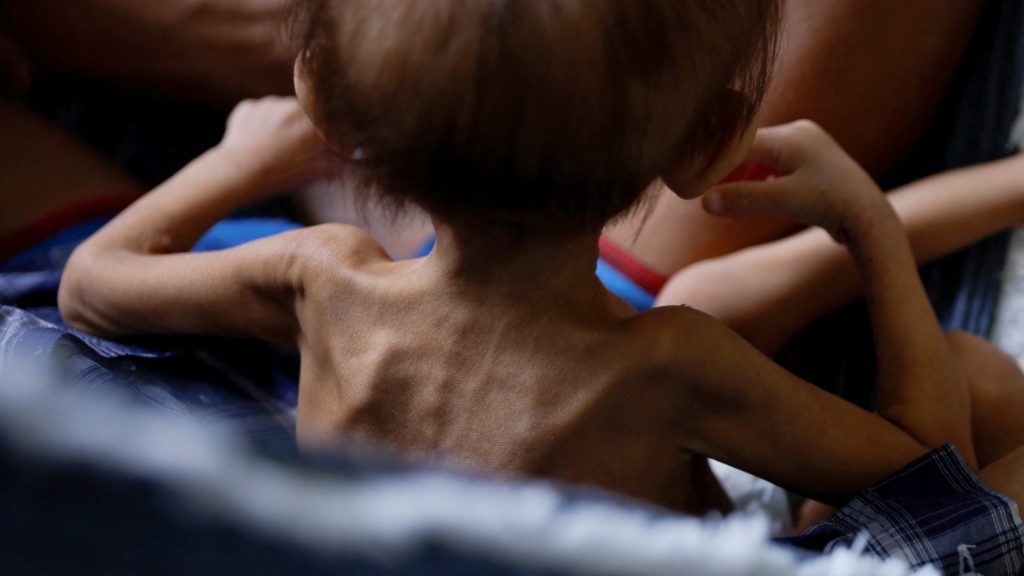The severe health care and hunger crisis affecting the Yanomami indigenous people in Roraima state prompted the Brazilian church to coordinate help and to work side by side with government agencies and indigenous organizations to provide food and medical attention to the sick.
Beyond the emergency actions, a number of Catholic voices have been demanding that the authorities who allowed the situation to get to this point must be properly held accountable for their misdeeds. That includes former President Jair Bolsonaro, who has been in Florida since his last day in office, Dec. 31.
The National Conference of Bishops of Brazil (CNBB) donated $70,000 to pay for food and medicine kits, with the support of Adveniat, the German episcopal charity-organization for Latin America and the Caribbean. Dioceses and church movements all over the South American country have been collecting funds among churchgoers and sending them to Roraima.
"There is a growing number of people asking the church to receive their donations to the Yanomami. Brazilian society is deeply mobilized with their problem and is willing to help," Antonio Eduardo de Oliveira, Secretary General of CNBB's Indigenous Missionary Council (known as CIMI), told OSV News.
On Jan. 31, Cardinal Leonardo Steiner, who heads the Archdioceses of Manaus, visited the Yanomami people in Boa Vista, Roraima’s capital, and gathered with indigenous leaders.
"In the hospitals, many Yanomami are still in critical condition due to malaria and starvation. But at the health clinics where some of the children are now located, we can already see them playing, which is a good sign of recovery," he told OSV News.
According to the Yanomami leaders heard by Cardinal Steiner, the current crisis is the result of the dismantling of the health care services provided by the government to the Indigenous over the past few years and of the invasion of their territory by illegal miners.
"They told me that several health care units inside the Yanomami territory were abandoned over the past years. Part of them were even occupied by illegal miners," the cardinal said.
There is an estimated number of 20,000 illegal miners operating in the region. According to analysts, they are backed by powerful financial groups, which provide machinery and airplanes to support their activities.
"They gradually destroy the rainforest and water streams. Most of the territory’s rivers are contaminated with mercury, directly impacting the Yanomami's health," Cardinal Steiner described.
The Yanomami have been living for centuries in a territory now divided between Brazil and Venezuela, in the Amazon. They established the first contact with the non-Indigenous Brazilian society in the first decades of the 20th century, but only in the 1960s a regular relationship -- mostly mediated by Catholic and Protestant missionaries -- was established.
Government-led initiatives of economic exploitation in their territory began during the Military dictatorship (1964-85) in the 1970s. Over the next decade, an estimated 40,000 illegal miners invaded the Yanomami territory in order to search for gold.
In the 1990s, most of them were taken out of the region. Over the past four years, a new wave of illegal mining began, this time with more machinery and air support. At least 26,000 illegal miners operated there during the Bolsonaro administration -- more than the number of Yanomami, estimated at 20,000 people.
The diseases brought by the miners -- including malaria and contamination by heavy metals -- have been causing hundreds of deaths. According to Lula's Minister of Indigenous Peoples Sônia Guajajara, 570 Yanomami children died over the past four years -- 100 of them in 2022.
Numerous denouncements of threats and violence against villagers have been made by the Yanomami organizations over the past years, but the Bolsonaro administration continually failed to take action.
"Since his presidential campaign in 2018 -- and even before that -- Bolsonaro incentivized the illegal miners' actions. He always said that Roraima is seated on gold. He was elected in 2018 by promising them that they would be able to carry out their activities," Laurindo Lazzaretti, a former priest who lived among the Yanomami for over a decade and is now a pastoral agent in the region, told OSV News.
The large pits provoked by mining in the Yanomami territory concentrate stormwater and create the perfect environment for the reproduction of malaria mosquitoes. That is why there has been a surge in the number of cases of the disease -- and in the number of deaths.
"The areas of mining also have bars and prostitution. Yanomami women have been continually subjected to sexual exploitation,” Cardinal Steiner lamented.
He described the case of a woman who was kidnapped, prostituted by the miners, and became pregnant. Shortly after birth, the child was taken by the criminals.
"The woman ended up committing suicide. That is the kind of human drama that has been occurring there," the cardinal said.
Both the local indigenous organizations and the church activists that work with them are now hopeful that President Luiz Inácio Lula da Silva's administration will act to address the problems.
"We believe that we now have an opportunity. We need to promote the complete removal of the illegal miners from the Yanomami territory," CIMI’s de Oliveira told OSV News.
For Cardinal Steiner, it is also necessary to bring to justice and hold accountable the authorities who failed to act in the past.
"It is a faraway, inaccessible region. However, one cannot understand how, considering our current technological level and the means and resources that the country has, 570 Yanomami could be abandoned and left to die," Cardinal Steiner said.
De Oliveira believes that Bolsonaro and members of his administration may be accused and tried for genocide.
"They did not do anything to change the Yanomami situation and created the current chaos," he said.

